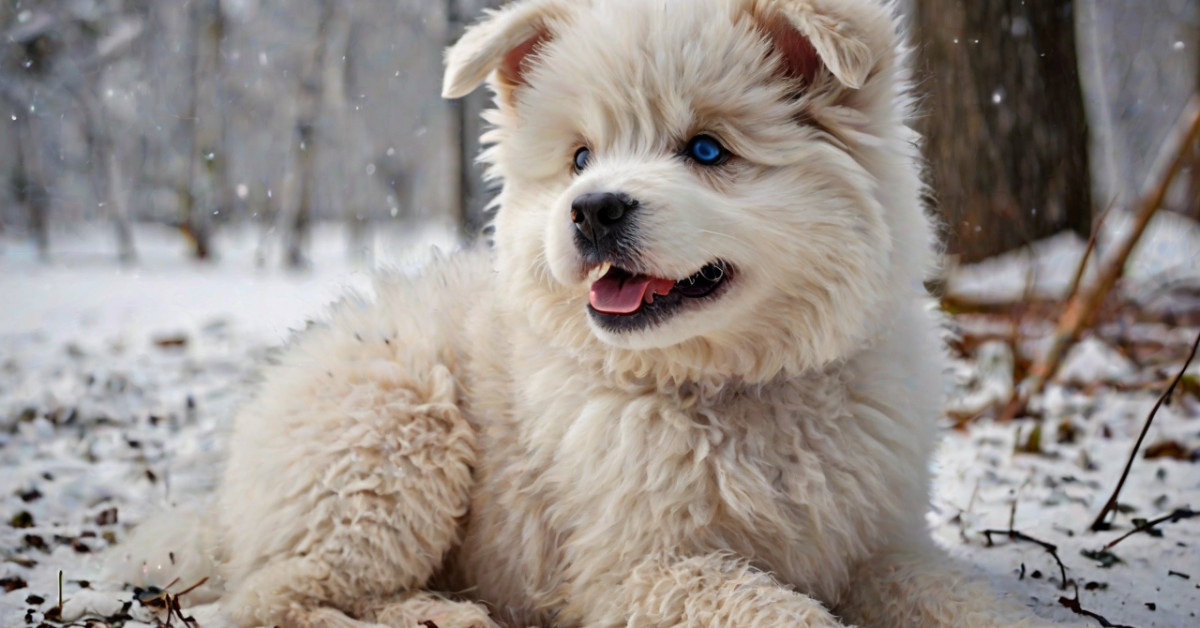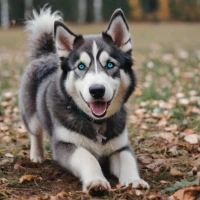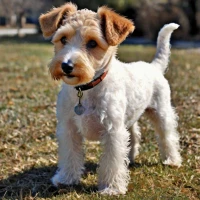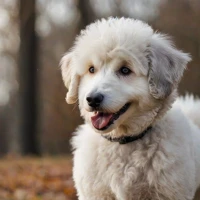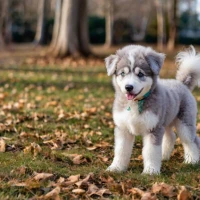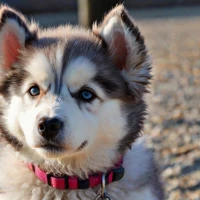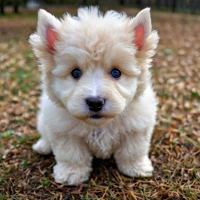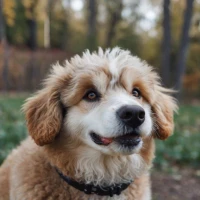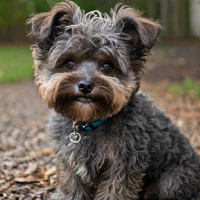My First Encounter with a Huskydoodle
I’ll never forget the first time I saw a Huskydoodle, or should I say a Huskypoo. It was at a friend’s housewarming party. They proudly introduced their new puppy, Max. I could barely take my eyes off this fluffy bundle of energy. Max had the striking blue eyes of a Siberian Husky combined with the delightful curly coat typical of a Poodle. I remember thinking, “Wow, this is an exceptional mix!” Little did I know, this encounter would spark a passion for Poodle mixes, particularly the unique blend of a Huskydoodle.
The Origins of the Huskydoodle
If you’re like me, you might marvel at the ingenuity behind bred dog mixes. A Huskydoodle is a designer breed, combining the Siberian Husky and Poodle, two elite breeds in their own rights. Siberian Huskies bring their storied history as hard-working, sled-pulling dogs from freezing climates, while the Poodle adds intelligence and hypoallergenic fur traits. Combining these breeds isn’t just a simple endeavor — it showcases human ingenuity in breeding.
Appearance and Physical Traits
The appearance of a Huskydoodle can be as varied as a box of crayons. Some may take after the Husky with piercing blue or even bi-colored eyes, while others inherit the Poodle’s distinctive curly coat. The coat colors can range from black, white, gray, brown, to even combinations thereof.
When I visited a breeder, I saw pups that looked as if they were painted by an artist, each one unique in its color mix. Another standout trait is their athletic build, merging the Husky’s robustness with the Poodle’s agile frame. The result is a dog ready for any adventure, from tugging sleds to mastering agility courses.
Temperament and Personality
Now, about their personality — if there’s one word that encapsulates a Huskydoodle, it’s “spirited”. These dogs tend to be lively, intelligent, and quick learners. I remember giving Max basic obedience training commands, and he picked them up almost instantly.
Their Poodle genes make them alert and easy to train, while Husky heritage bestows them with a strong will and sometimes, a bit of stubbornness. If you’re considering adopting one, be prepared for an adventure, both in training and daily life.
Training and Exercise Needs
Training isn’t just a necessity; it’s a ritual with Huskydoodles. Their high intelligence can be both a boon and a challenge. Using positive reinforcement techniques works wonders, but patience is key. I remember the countless afternoons spent in my backyard, teaching Max tricks like sit, stay, and even fetch. And boy, does he have energy to burn.
A fun fact: Huskies are known for their endurance, often running long distances in challenging terrains. Add the Poodle’s knack for agility and you’ve got an energetic companion who won’t tire easily. Daily exercise is crucial to keep them happy and healthy. Long walks, fetch games, and maybe even a swim — these are all part of a balanced workout for a Huskydoodle.
Grooming Essentials
One glance at a Huskydoodle tells you grooming isn’t going to be a breeze. Their coats can range from wavy to tightly curly, and they need regular brushing to prevent tangles and mats. I recall the preening sessions Max and I would share. He’d sit (somewhat) patiently, while I brushed through his soft fur, often finding myself tangled in his curls more than once. Frequent grooming also keeps their coats clean and reduces the risk of skin issues.
Poodle Traits and Allergies
A noteworthy point: Huskydoodles often inherit the hypoallergenic coat from their Poodle parent. While no dog breed is completely hypoallergenic, they do tend to shed less, which is great news for allergy sufferers. I’ve had friends who usually break out in sneezes around dogs but found themselves perfectly comfortable around Max.
Health Considerations
Like any breed, Huskydoodles come with their own set of health considerations. Both Siberian Huskies and Poodles have certain genetic predispositions, so it’s vital to be aware and mindful of potential issues. Joint dysplasia, eye conditions like cataracts, and skin problems are some health concerns to watch out for.
Regular vet check-ups, a nutritious diet, and an active lifestyle go a long way in preventing health complications. Speaking from experience, early detection and preventive care are the keys to a happy, healthy life for your furry friend.
Socialization and Interaction
Don’t underestimate the importance of socializing your Huskydoodle early on. Exposure to various environments, people, and other animals will shape a well-rounded and confident dog. I remember taking Max to dog parks and puppy classes. Those were the moments he learned to play nice and socialize.
Their playful nature can sometimes border on exuberance, so teaching them proper manners from a young age is crucial. A Huskydoodle can get along well with children and other pets, ensuring they have their playful nature nurtured in a positive environment.
Nutrition and Diet
Feeding a Huskydoodle doesn’t just mean tossing kibble into a bowl. Like any active breed, they require a balanced diet rich in proteins, healthy fats, and essential nutrients. I spent hours researching the best diet options for Max, eventually opting for a mix of high-quality commercial dog food and fresh, whole foods.
Omega-3 fatty acids, found in fish oil, are particularly beneficial for their skin and coat health, while glucosamine supplements can aid in joint health. Remember to always consult with your vet to tailor a diet that suits your pet’s specific needs.
Mental Stimulation for the Intelligent Pooch
Huskydoodles are intelligent dogs needing mental stimulation to prevent boredom. Puzzle toys, interactive games, and even training sessions keep their minds sharp and occupied. I found that rotating Max’s toys and introducing new challenges kept him engaged.
These activities aren’t just about keeping them busy; they foster bonding and trust between you and your pet. A tip: try incorporating training tasks into playtime. It’s a win-win!
Huskydoodle in City Life
Wondering if this breed can adapt to city living? Absolutely, with some caveats. While their active nature might suggest a need for vast open spaces, city life can work if you ensure they get enough exercise and stimulation. I live in an apartment and found that regular walks, park visits, and indoor play sessions keep Max content.
Cities offer unique stimuli that can be great for their socialization, but it also means being vigilant about their safety and well-being, particularly in crowded areas.
Huskydoodle in Country Life
On the flip side, a countryside environment is practically a Huskydoodle paradise. Open fields, running trails, and fewer restrictions on activities provide an ideal setting for their energetic and adventurous spirits. Watching Max sprint across a meadow with unbridled joy is something I cherish.
However, a rural setting requires good training to ensure they don’t wander too far, given their strong prey drive.
Fun Activities You Can Do with Your Huskydoodle
Life with a Huskydoodle is anything but dull. From hiking and jogging to agility courses and swimming, there’s a plethora of activities to enjoy together. I’ve taken Max on several hiking adventures, each time marvelling at his stamina and enthusiasm.
Maybe try your hand at skijoring — a winter sport combining cross-country skiing and dog sledding. It’s not only unique but a perfect fit for a Huskydoodle’s abilities.
Choosing a Huskydoodle: What to Consider
Thinking of bringing a Huskydoodle into your life? There are considerations before making that commitment. Research breeders thoroughly, ensuring ethical practices and healthy breeding standards. Meet the pups’ parents if possible; it gives insight into potential personality and health traits.
Adoption is also a wonderful option. Many mixed breeds, including Huskydoodles, can be found in shelters and rescue organizations. Take time to meet a few dogs and assess if their energy levels and personalities suit your lifestyle.
Personal Experiences from Other Owners
Friends and fellow dog enthusiasts often swap stories about their Huskydoodles. An acquaintance once shared how her dog, Luna, became the star of her neighborhood with her distinctive looks and friendly demeanor. Luna had a knack for making everyone smile, from energetic kids to elderly neighbors.
These personal anecdotes add depth to the understanding of what life with a Huskydoodle is genuinely like.
Common Misconceptions
There are a slew of misconceptions around designer breeds. One common myth is that they are inherently healthier than purebreds. While hybrid vigor can sometimes reduce the occurrence of certain genetic conditions, it doesn’t make them immune. It’s essential to understand the health risks of both parent breeds and be prepared for responsible pet care.
Another misconception is that designer breeds like Huskydoodles are easier to manage due to mixed traits. In reality, their spirited personality and high energy can be quite a handful, requiring dedicated effort in training and care.
The Best of Both Worlds
The magic of a Huskydoodle lies in the harmonious blend of two distinctive breeds, creating a dog that’s as unique as it is lovable. They bring together the Siberian Husky’s adventurous spirit and the Poodle’s intelligence and elegance, resulting in a companion ready for just about anything life throws your way.
Whether it’s a lazy Sunday cuddled on the couch or an adrenaline-fueled hike, a Huskydoodle fits into your life with grace and exuberance.
Famous Huskydoodles and Pop Culture
Believe it or not, Huskydoodles have even made their mark in pop culture. While they might not be as renowned as some other breeds, several Instagram-famous dogs have brought attention to their charm. Accounts like @max_the_huskydoodle showcase the daily antics and gorgeous looks of this fascinating hybrid, drawing fans from all over the world.
Their rising popularity is a testament to their photogenic nature and endearing personality.
Rescue and Adoption
Before opting for a breeder, consider giving a home to a rescue Huskydoodle. Numerous organizations and shelters have wonderful dogs just waiting for their forever home. Rescue dogs often come with the added benefit of being house-trained and socialized.
Adopting a dog not only transforms their life but enriches yours in immeasurable ways.
Is a Huskydoodle Right for You?
In the end, it all comes down to compatibility. Are you ready for the commitment and energy a Huskydoodle requires? They might not be the best fit for someone with a laid-back lifestyle but are perfect for active individuals or families who can match their pace and provide the mental stimulation they crave.
Consider your living situation, time, and resources before bringing one into your life.
Final Thoughts and Reflection
Overall, my journey with Max has been nothing short of exhilarating. The blend of Husky and Poodle traits creates a dog full of surprises and endless joy. Their unique combination brings a delightful mix of energy, intelligence, and loyalty, making life rich and rewarding.
Thanks for taking the time to read about the fascinating world of Huskydoodles.🐾 Remember, every pet brings something special into our lives. Why not share your adventures with a Huskydoodle? Until next time, stay pawsitive!
